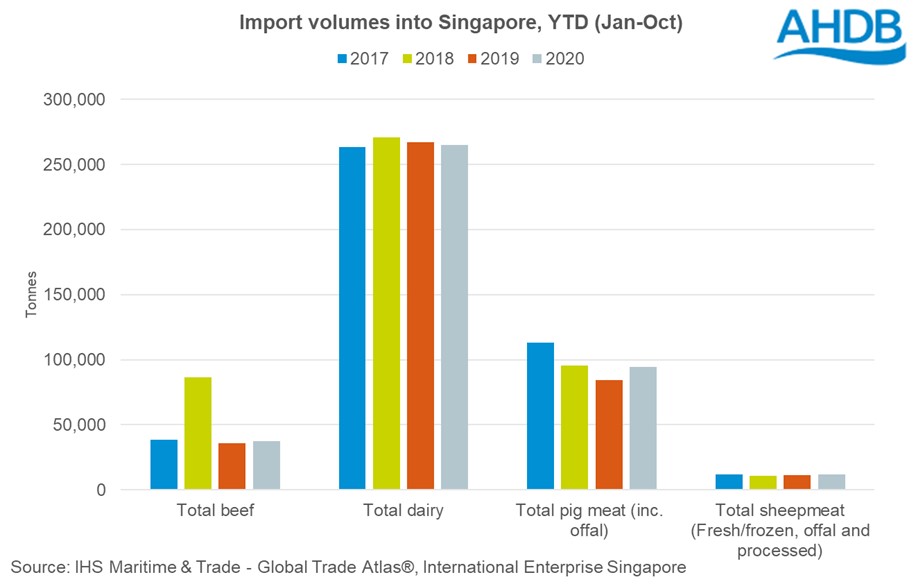A closer look at Singapore’s imports
Thursday, 17 December 2020
By Bronwyn Magee
On the 10 December, the UK signed a free trade agreement with Singapore which maintains UK access to that market after the UK leaves the EU.

What products does Singapore import?
In the year to October, imports of all product groups into Singapore increased, except dairy, which fell by a marginal 1% on the year. Imports of pig meat grew most notably, up by 12% (9,800 tonnes) compared to the same period last year, while shipments of beef (4%) and sheep meat (3%) also increased.
In terms of volume, dairy is the largest product group imported by Singapore, reaching 264,900 tonnes in the year to October. Accounting for most of these imports are shipments from Australia, New Zealand, and Thailand. As of October, the UK accounted for only 1% of all dairy product imports in the year to date.
In October, imports of pig meat totalled 9,700 tonnes, up 17% compared to the same month last year. Imports for the year to date (Jan – Oct) totalled 94,300 tonnes, with most shipments coming from Brazil (43,900), while the UK made up 1% (1,000 tonnes).
Imports of beef fell by 8% on the year in October to 3,800 tonnes. Despite this fall, beef imports of the year to date increased by 1,300 (4%) tonnes compared to the same period last year. Brazil once again accounted for most of these imports (50%), with shipments from Australia also making a notable contribution (26%).
Meanwhile, sheep meat imports lifted by a significant 51% on the year in October, to 1,800 tonnes. Imports for the year to date (Jan-Oct) totalled 11,800, up 3% compared to the same period last year. The majority of these shipments came from Australia at 9,900 tonnes (84%) in the year to date.
Under this continuity agreement, tariffs will remain eliminated for most of Singapore exports to the UK, allowing Asian food products to enter the UK tariff free, up to a combined quote of 350 tonnes annually. Meanwhile, UK products will continue to benefit from duty free access to the Singapore market.
At present, the UK accounts for only a small share of the import volumes for the product groups listed. The agreement focuses on other goods and services, including negotiations on a UK-Singapore Digital Economy Agreement, but it would not stand in the way of possible export opportunities for UK agricultural products in the future.
Sign up to receive the latest information from AHDB.
While AHDB seeks to ensure that the information contained on this webpage is accurate at the time of publication, no warranty is given in respect of the information and data provided. You are responsible for how you use the information. To the maximum extent permitted by law, AHDB accepts no liability for loss, damage or injury howsoever caused or suffered (including that caused by negligence) directly or indirectly in relation to the information or data provided in this publication.
All intellectual property rights in the information and data on this webpage belong to or are licensed by AHDB. You are authorised to use such information for your internal business purposes only and you must not provide this information to any other third parties, including further publication of the information, or for commercial gain in any way whatsoever without the prior written permission of AHDB for each third party disclosure, publication or commercial arrangement. For more information, please see our Terms of Use and Privacy Notice or contact the Director of Corporate Affairs at info@ahdb.org.uk © Agriculture and Horticulture Development Board. All rights reserved.

